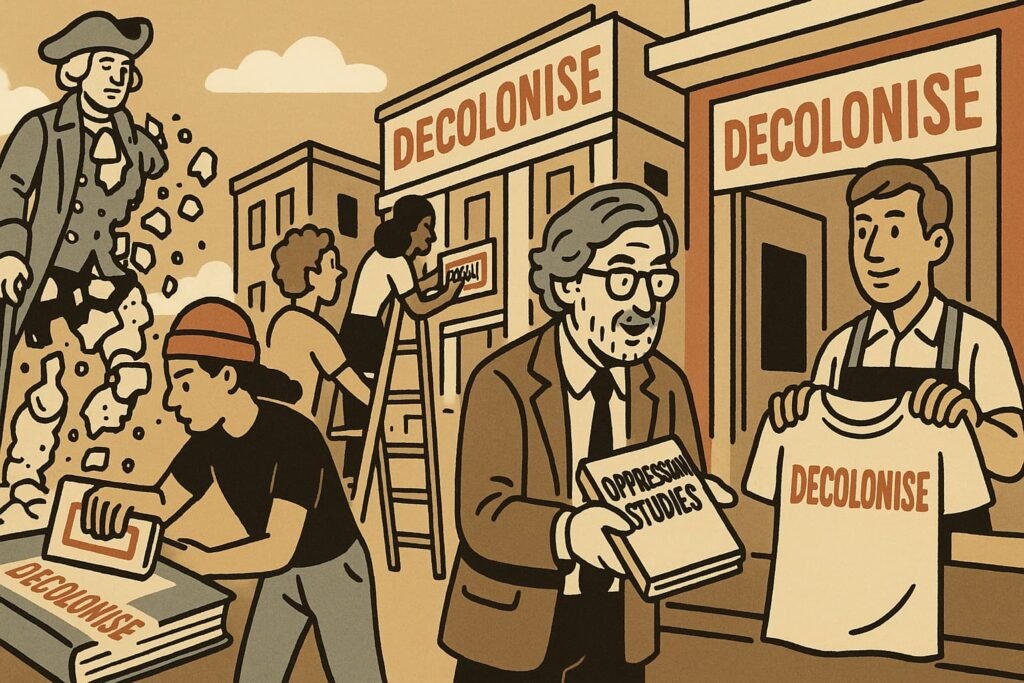Postcolonial Theory – When Empire Never Ends
From History to Perpetual Guilt
Colonial empires collapsed decades ago. Most nations run their own affairs. But in Western universities, colonialism never really ended — at least not in theory.
Enter Postcolonial Theory. Born in the 1970s–80s, it argues empire still shapes culture, economics, and politics today. Independence didn’t erase oppression — it just disguised it.
The promise was justice. The result? A worldview where Western success is always theft, and history is an eternal moral debt.
Table of contents
What Is Postcolonial Theory?
In plain terms, Postcolonial Theory says:
- Colonialism may be over politically, but its logic still runs the world.
- Western culture, literature, and science are tools of domination.
- Languages like English and French extend imperial control.
- True justice means rewriting history and institutions through the lens of the colonised.
In short: colonialism isn’t history — it’s alive, hidden in every inequality.
Buzzwords of Postcolonial Theory
The field comes wrapped in jargon:
- Decolonise – Rewrite curriculums and institutions to purge “colonial bias.”
- Eurocentrism – The sin of viewing history through Western achievements.
- Subaltern – The marginalised voices excluded from dominant narratives.
- Epistemic Violence – Knowledge itself framed as a form of oppression.
These terms transform empire into a permanent, all-purpose explanation.
How Postcolonial Theory Shows Up in Practice
- In Education: “Decolonise the curriculum” campaigns — classics replaced with activist texts.
- In Activism: Global inequality, migration, and even climate change framed as colonial legacy.
- In Politics: Demands for reparations and guilt-driven diplomacy.
- In Corporations: Multinationals run “decolonise” marketing while still outsourcing cheap labour.
What began as critique of empire is now a tool for politics and branding.
Why Institutions Promote Postcolonial Theory
- Academics: A limitless field for publishing and conferences.
- Activists: A universal lever — every injustice traced back to empire.
- Corporations: Cheap “decolonise” campaigns to look progressive.
- Politicians: Use guilt politics to justify payouts or policies.
Once again, the biggest winners are elites who manage the narrative, not the people supposedly liberated.
The Consequences of Postcolonial Theory
- Endless Guilt: Western nations cast as villains forever.
- Overreach: Unrelated issues reframed as colonialism in disguise.
- Selective Memory: Local corruption and failures often ignored.
- Self-Serving: Benefits Western academics and NGOs more than former colonies.
The irony? A theory meant to empower the colonised often empowers Western elites instead.
Why It Matters
Postcolonial Theory isn’t just classroom debate. It shapes schools, activism, diplomacy, and corporate campaigns. By keeping empire alive in theory, it ensures endless blame, endless guilt, and endless funding.
Conclusion: From Empire to Industry
Postcolonial Theory began with a valid critique — empires left real scars. But it has become a political project where history never ends, and guilt never expires.
The fight for independence was replaced with a business of grievance.
NEXT: Climate Justice
For a deeper understanding of Critical Theory, check out our Critical Theory Explainer Hub.
FAQ
What is Postcolonial Theory in simple terms?
It’s the idea that colonialism never really ended, and today’s inequalities are proof of its legacy.
Where did it come from?
It developed in the 1970s–80s, influenced by thinkers like Edward Said, Gayatri Spivak, and Homi Bhabha.
Why is Postcolonial Theory controversial?
Because it frames Western nations as permanent oppressors and fuels guilt-based politics.
How does it affect society today?
It drives decolonisation campaigns, activist framing, and reparations debates.
What’s the danger of Postcolonial Theory?
That it locks nations into endless guilt instead of building practical solutions.



